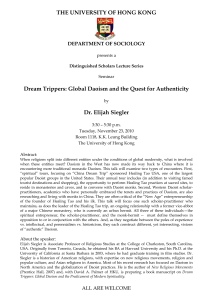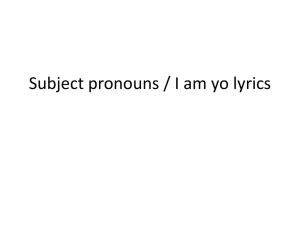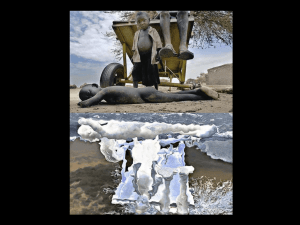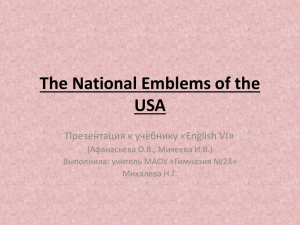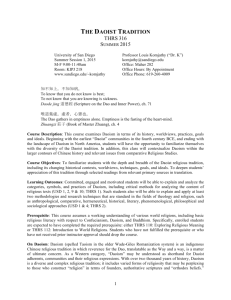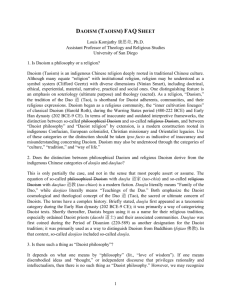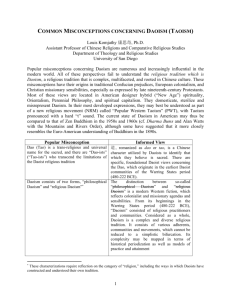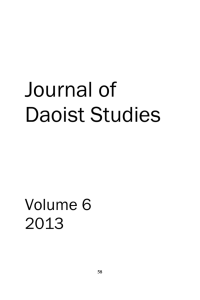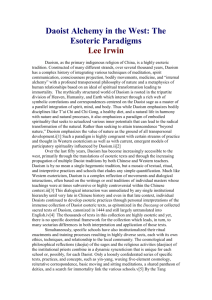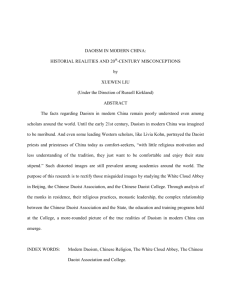Lecture Outline 22
advertisement
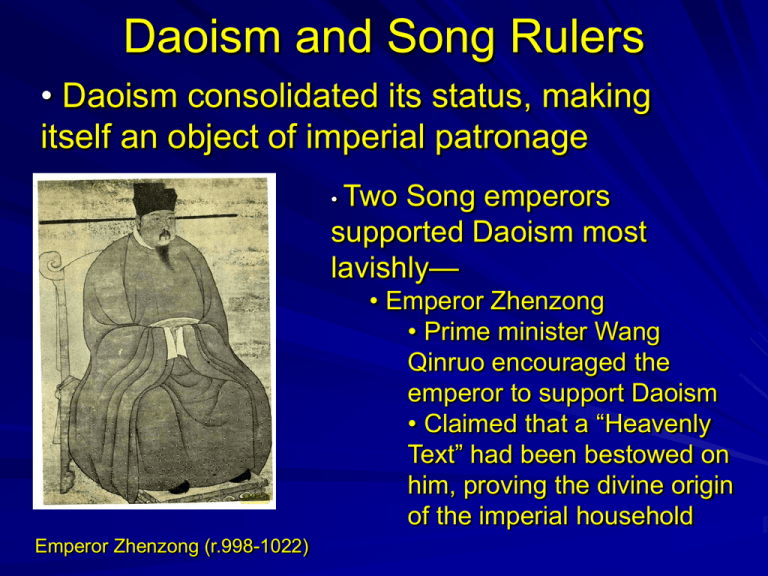
Daoism and Song Rulers • Daoism consolidated its status, making itself an object of imperial patronage • Two Song emperors supported Daoism most lavishly— • Emperor Zhenzong • Prime minister Wang Qinruo encouraged the emperor to support Daoism • Claimed that a “Heavenly Text” had been bestowed on him, proving the divine origin of the imperial household Emperor Zhenzong (r.998-1022) Wang Qinruo led Daoists at court to egg on Emperor Zhenzong to perform the feng & shan sacrifices – Zhenzong, went up to Mt. Tai to perform the sacrificial ceremonies. After the sacrifice, Zhenzong began his investiture of the [Daoist] gods, including the emperor of heaven, Jade Emperor. [Yuhuang dadi, or Yudi] Zhenzong devoted himself to the Perfected Lord “Protector of Sageliness” (Yisheng zhenjun) Emperor Huizong (r. 1101-1125) – Highly honored Daoism and followed Daoist advice to suppress Buddhism – Taoist advisor Lin Linsu urged him to develop Divine Empyrean cosmology and ritual based on Divine Empyrean School of Daoism Huizong, following Lin Lingsu’s advice, began to build a temple network across the country, called Divine Empyrean Palaces (Shenxiao gong) All prefectures had a Divine Empyrean Palace built Many Buddhist temples were converted to Divine Empyrean Palaces Officials were appointed to supervise these palaces to assure total control of them Women, Education, and Family Young girls received Confucian education and studied Confucian classics, even though they were not allowed to take the civil service exams They were taught to read the Canon of Women’s Filial Piety , the Biographies of Women, and the Admonitions of Women After they became mothers, they became teachers of their children, who, when growing older, were sent to family or clan schools A woman could change her social status and family identity after she married into a scholar’s family A daughter-in-law had to follow all the rules of filial piety described in the Canon of Women’s Filial Piety , putting others first, herself last The need to fulfill their duties and do the daily chores around the house made them servants of their parents-in-law Women in upper-class households could fund ways to modify or elude strict rules but would be forced to divorce by monthers-inlaw Painting Illustrating the Canon of Women’s Filial Piety Chapter 9: daughters-in-law in commoners’ families spun thread, tailored garments… They were also taught to read a collection of twenty-four exemplary stories about the morals of male and female protagonists. These stories emphasize the filial duties that sons and daughters have to fulfill to the best of their abilities, including cutting flesh from one’s thigh to feed a hungry or sick mother. Women became liable to social injustice if they could not fulfill their filial duties as expected by the society Literacy rate continued to climb and highly educated women proliferated Lu You (S. Song) was forced to divorce his wife, and wrote a poem almost thirty years later to describe in her voice the desperate situation that led to the divorce: I was stupid to be sure, yet I knew That Madam, my mother-in-law, must be obeyed. Out of bed with the first cock’s crowing, I combed and bound my hair, put on blouse and skirt. I did my work, tidied the hall, sprinkling and sweeping, In the kitchen prepared their plates of food. Green green the mallows and goosefoot I gathered-- Too bad I could not make them taste like bear’s paws. When the least displeasure showed in Madam’s face, The sleeves of my robe were soon damp with tear stains. My wish was that I might bear a son, To see Madam dandle a grandson in her arms. But those hopes in the end failed and came to nothing; Ill-fated, they made me the butt of slander. Driven from the house, I did not dare grumble, Only grieved that I’d betrayed Madam’s kindness. Neo-Confucian moralists urged women not to remarry after their husbands died, which defines the meaning of “female chastity” Song laws entitled women to own property. Their dowries stayed with them even after they became divorced, widowed, or after they remarried Women enjoyed considerable independent control of their asset Traditional division of work—men responsible for wai (external affairs), women responsible for nei (internal affairs)—no longer holds true for Song women and it didn’t change until Yuan. Although women were discouraged from singing, composing poetry, or playing music, eminent female poets and scholars emerged, most famous of them was Li Qingzhao Also a book collector and connoisseur of antiquities Many of them also became pious Buddhists. Those from upper-class families donated land, silver, textiles to monasteries, helping Buddhist institutions to grow. Women and Marriage Women’s status indicates that Song did not necessarily adhere to the patrilineal ideal Wives took over the financial affairs of the family estate They occasionally went into business themselves to enhance the wealth of the lineage The wife ranked at the top of the female hierarchy, especially when she had daughters-in-law and became widowed. Hypergamy remained a norm in Song society, although more and more affluent households, particularly that of wealthy merchants, married their daughters into upper-class, scholar-officials’ families A matchmaker was hired to start the marriage process She would present a “draft card” containing a list of information about the two families, including the dates of birth…. “Portrait of Laozi,” by Muxi, Southern Song. Okayama Prefectural Museum of Art “Discussing the Dao under the Shade of the Pine Tree” or “Three Teachings on the Dao” anonymous, Southern Song Daoism and Daoist Heaven • Daoists engineered the search and discovery of celestial omens – Discovery of “heavenly texts” (tianshu) that confirmed the Zhao family’s possession of the mandate of heaven. Daoist officials of Earth Daoist officials of Water The Eastern Floriate Celestial Emperor (Donghua Tiandi jun) flanked by attending gods and goddesses, called Golden Youths (Jintong) and Jade Maidens (Yunü) “Procession of Immortals Paying Homage to the Primodial” by Wu Zongyuan (active 11th C), Northern Song. Wu was known for having made handscroll copies of two Wu Daozi murals in Kaifeng “Procession of Immortals Paying Homage to the Primordial,” Wu Daozi’s original paintings The Expansion of Daoism Daoism enjoyed greater support during Huizong’s reign; support extended to – Temples, lineages, and leaders The Maoshan school of Daoism (25th patriarch) The Celestial Master School, or the Orthodox Unity School (30th patriarch) – Daoist magicians and recluses Lin Lingsu, founder of the Divine Empyrean Order of Daoism, was most influential Under his influence, Emperor Huizong proclaimed himself the Sovereign of the Grand Empyrean – Publication of a new Daoist canon Popular Daoist Gods Black Killer (Heisha), Perfected Warrior (Zhenwu), and Tianpeng – Three principal agents of the Emperor of the North (beidi) – Connected with ritual masters as exorcists Black Killer has been identified as Perfected Lord “Protector of Sageliness” – Revelations of Black Killer was at the center of imperial legitimatization, succession, the Mandate of Heaven in the early Song. – Ritual masters invoked Black Killer to perform therapeutic ritual Popular Daoist Immortals Lü Dongbin is a patriarch of the Quanzhen sect and is one of the famed Eight Immortals (Baxian). He is believed to have lived in the late Tang dynasty and his following became widespread during the Song. The Daoist Immortal Lü Dongbin, Yuan Dynasty, Hanging Scroll, The NelsonArtkins Museum of Art, Kansas City Worshiped as the patron saint of merchants, pharmacists, inkmakers, and scholars. Accounts of his life are full of wonders and are inspiring. Bestknown of the stories is “The Yellow-Millet Dream” (Huang Liangmeng) “Lü Dongbin Appearing at the Yueyang Pavilion,” Southern Song, Fan Painting, The Metropolitan Museum of Art, New York. “Lü Dongbin Crossing the Lake Dongting,” Southern Song, Fan Painting. Museum of Fine Arts, Boston New Daoist Sects New Daoist sects appeared during the 12th to 13th centuries: – The Perfect Truth Sect (Quanzhen jiao) was the most popular – Founder Wang Zhe (1112-1170?) and his early followers rejected the alchemical and magical practices and absorbed Confucian and Buddhist ideas into its doctrines – Popular beliefs and magic were eventually incorporated into its system – Advocated the balance and harmony of body and mind, no overexertion, cloud-like wandering, intuitive learning, cultivation of inner self, the art of herbal medicine, simplicity, love without attachment, pure meditation, purified mind “Portrait of Bodhisdharma” by Muxi, Southern Song Left: “Bodhidharma,” Anonymous, Song dynasty, National Palace Museum, Taipei,Taiwan Middle: “Bodhidharma Crossing the Yangzi River on a Reed” by Li Yaofu, Yuan dynasty Beginning of Syncretic Religion Evidenced by the emergence of “Morality Books,” (shan shu) such as Book of Rewards and Punishments – The books were highly eclectic, Mixed Buddhist concepts of karma, retribution, and salvation, Daoist concepts of immortality, nature and cosmology, and Confucian ethics of loyalty, filiality, humanity, and righteousness Views on illness – Spirits in heaven and earth judged people’s transgressions, inflicted pains on them, and diminished their life expectancy Song Views of Good and Evil Morality books reflect Song moralists’ views on good and evil: Good people: – Those who perform good deeds – can hope to become immortal Evil people: – Those who perform bad deeds, including: – Killing animals shoot creatures that fly and hurt those that run Block up animals’ dens and overturn birds’ nests, injuring hens and breaking their eggs – Destroying lives Commit infanticide and perform abortions – Disrupting family and social order Break up marriage, engage in quarrels and lawsuit Seek women’s advice rather than parents’ Do not live harmony with wives, or do not respect husbands Life span will be shortened, retribution will be extended to sons and grandsons If death is not imminent, disease or calamities will befall them
